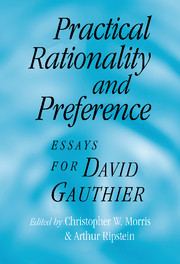Book contents
- Frontmatter
- Contents
- List of Contributors
- Practical Reason and Preference
- What Do Expressions of Preference Express?
- Preference
- Rational Temptation
- Bombs and Coconuts, or Rational Irrationality
- Are Intentions Reasons? And How Should We Cope with Incommensurable Values?
- Two Forms of Practical Generality
- Psychology for Cooperators
- Which Games Should Constrained Maximizers Play?
- The Strategy of Cooperation
- We Were Never in Paradise
Two Forms of Practical Generality
Published online by Cambridge University Press: 11 January 2010
- Frontmatter
- Contents
- List of Contributors
- Practical Reason and Preference
- What Do Expressions of Preference Express?
- Preference
- Rational Temptation
- Bombs and Coconuts, or Rational Irrationality
- Are Intentions Reasons? And How Should We Cope with Incommensurable Values?
- Two Forms of Practical Generality
- Psychology for Cooperators
- Which Games Should Constrained Maximizers Play?
- The Strategy of Cooperation
- We Were Never in Paradise
Summary
This essay is an inquiry into the workings of two concepts, practical disposition and social practice, as they enter, or might enter, into moral philosophy. Or rather, it is a fragment of such an inquiry. Its point of departure is a pair of familiar tendencies in moral philosophy, the tendencies we meet with in what might be called dispositional accounts of the rationality of morality and practice versions of utilitarianism. Of course, the concepts of a practice and a disposition enter into other types of moral theory, some of them perhaps intuitively more attractive than either of these. But the deployment of our concepts in these two lines of thought is, I think, uniquely clear and intelligible. A study of their workings here can therefore be expected to supply a general elucidation of the two concepts as they are properly understood in practical philosophy and thus potentially in quite different types of normative theory.
The concepts practice and disposition appear at first sight to be quite diverse: One looks to be a concept proper to social theory, the other perhaps to psychology. A comparative treatment will, I hope, tend to burn off this dross of associated ideas and reveal an underlying kinship at least in their specifically practical-philosophical use. But further, recognition of this kinship will in turn put us into contact with a more extensive class of practical concepts and with it a larger logical, metaphysical, and normative topic, namely, the role of a certain kind of generality in practice and practical thought.
Information
- Type
- Chapter
- Information
- Practical Rationality and PreferenceEssays for David Gauthier, pp. 121 - 152Publisher: Cambridge University PressPrint publication year: 2001
Accessibility standard: Unknown
Why this information is here
This section outlines the accessibility features of this content - including support for screen readers, full keyboard navigation and high-contrast display options. This may not be relevant for you.Accessibility Information
- 5
- Cited by
